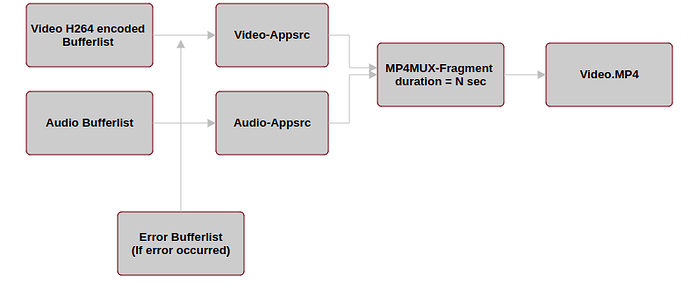Hello Tim,
I have attached the code files for your reference. Could you please take a look and help me resolve the issue in my code?
#include <gst/gst.h>
#include <stdio.h>
#include <gst/app/gstappsink.h>
#include <gst/app/gstappsrc.h>
#include <gst/gstbufferlist.h>
static GstBufferList *buflist, *copy_buflist;
static GstPad *identity_src_pad;
GstFlowReturn retval;
GstElement *pipeline, *v4l2src, *identity,*videoconvert, *queue, *valve, *x264enc, *mp4mux, *filesink;
GstBus *bus;
GstMessage *msg;
gboolean terminate = FALSE;
void convertToMP4(GstBufferList *buflist)
{
// Create pipeline for MP4 conversion.
GstElement *pipeline, *appsrc, *videoconvert, *videoencode, *muxer, *file_sink;
pipeline = gst_pipeline_new("MP4-pipeline");
appsrc = gst_element_factory_make("appsrc", "source");
muxer = gst_element_factory_make("mp4mux", "mp4-muxer");
file_sink = gst_element_factory_make("filesink", "filesink");
g_object_set(G_OBJECT(appsrc),
"stream-type", 0,
"format", GST_FORMAT_TIME, NULL);
g_object_set(G_OBJECT(muxer), "fragment-duration", 2000, NULL);
// Set the resolution and framerate caps
// GstCaps *caps = gst_caps_new_simple("video/x-raw",
// "width", G_TYPE_INT, 1280,
// "height", G_TYPE_INT, 720,
// "framerate", GST_TYPE_FRACTION, 10, 1,
// NULL);
// gst_app_src_set_caps (GST_APP_SRC(appsrc),caps);
// gst_caps_unref(caps);
g_object_set(file_sink, "location", "NEW_VIDEO.mp4", NULL);
gst_bin_add_many(GST_BIN(pipeline), appsrc,muxer, file_sink, NULL);
if (gst_element_link_many(appsrc,muxer, file_sink, NULL) != TRUE)
{
g_printerr("Elements could not be linked in the pipeline.\n");
gst_object_unref(pipeline);
exit(1);
}
copy_buflist = gst_buffer_list_copy_deep(buflist);
g_print("isbuffered is filled and Buffer size is %d\n", gst_buffer_list_length(copy_buflist));
gst_element_set_state(pipeline, GST_STATE_PLAYING);
retval = gst_app_src_push_buffer_list(GST_APP_SRC(appsrc), copy_buflist);
g_print("RETVAL %d\n", retval);
g_print("Sending EOS!!!!!!!");
g_signal_emit_by_name(appsrc, "end-of-stream", &retval);
}
static GstPadProbeReturn pad_probe_cb(GstPad *pad, GstPadProbeInfo *info, gpointer user_data)
{
printf("ERROR FRAMES PAD_PROBE");
static GstClockTime timestamp = 0;
GstMapInfo map;
GstBuffer *buff;
GstBuffer *new_buffer;
buff = gst_pad_probe_info_get_buffer(info);
gsize buffer_size = gst_buffer_get_size(buff);
double bufferSizeMB = static_cast<double>(buffer_size) / (1024 * 1024);
new_buffer = gst_buffer_copy_deep(buff);
// g_print(" timestamp : %ld\n", GST_BUFFER_PTS(new_buffer) / 1000000000);
if (bufferSizeMB > 0)
gst_buffer_list_add(buflist, new_buffer);
g_print("Buffer length is %d\n", gst_buffer_list_length(buflist));
if (gst_buffer_list_length(buflist) == 100)
{
convertToMP4(buflist);
gst_buffer_list_unref(buflist);
buflist = gst_buffer_list_new();
}
return GST_PAD_PROBE_OK;
}
void setValvevalue()
{
g_object_set(G_OBJECT(valve), "drop", false, NULL);
g_object_set(G_OBJECT(queue), "max-size-time", 0, "leaky", 0, NULL);
printf("drop value setted tp false\n");
}
int stopStream()
{
gst_element_set_state(pipeline, GST_STATE_NULL);
}
int start_recording_camera()
{
gst_init(NULL,NULL);
// Create GStreamer elements
pipeline = gst_pipeline_new("pipeline");
v4l2src = gst_element_factory_make("v4l2src", "v4l2-source");
videoconvert = gst_element_factory_make("videoconvert", "video-convert");
queue = gst_element_factory_make("queue", "queue");
valve = gst_element_factory_make("valve", "valve");
x264enc = gst_element_factory_make("x264enc", "x264-encoder");
identity = gst_element_factory_make("identity", "identity");
mp4mux = gst_element_factory_make("mp4mux", "mp4-muxer");
filesink = gst_element_factory_make("fakesink", "fake-sink");
if (!pipeline || !v4l2src || !videoconvert || !queue || !valve || !x264enc || !mp4mux || !filesink) {
g_printerr("One or more elements could not be created. Exiting.\n");
return -1;
}
// Set element properties
g_object_set(G_OBJECT(v4l2src), "device", "/dev/video0",NULL);
g_object_set(G_OBJECT(mp4mux), "fragment-duration", 2000, NULL);
g_object_set(G_OBJECT(valve), "drop", false, NULL);
g_object_set(G_OBJECT(x264enc), "tune", 4, NULL);
//g_object_set(G_OBJECT(filesink), "location", "NF_video.mp4", NULL);
// Build the pipeline
gst_bin_add_many(GST_BIN(pipeline), v4l2src, videoconvert, queue, valve,identity, x264enc, mp4mux, filesink, NULL);
gst_element_link_many(v4l2src, videoconvert,queue,valve, x264enc,identity, mp4mux, filesink, NULL);
identity_src_pad = gst_element_get_static_pad(identity, "src");
// // Create a buffer list and attach it to the pipeline user_data
buflist = gst_buffer_list_new();
// Add probe to the identity source pad
gst_pad_add_probe(identity_src_pad, GST_PAD_PROBE_TYPE_BUFFER, pad_probe_cb, pipeline, NULL);
// Set the pipeline to the "playing" state
gst_element_set_state(pipeline, GST_STATE_PLAYING);
}
void testAPI(int apiNumber) {
//std::thread startStreamThread;
switch (apiNumber) {
case 1:
printf("Testing startStream API\n");
// startStream(width,height);
start_recording_camera();
//startStreamThread = std::thread(startStream);
//startStreamThread.join(); // Wait for the thread to finish*/
break;
case 2:
printf("Testing setValvevalue API\n");
setValvevalue();
break;
case 3:
printf("Testing Stopstream API\n");
stopStream();
break;
default:
printf("Invalid API number\n");
break;
}
}
int main(int argc, char *argv[]) {
int apiNumber;
while (1) {
// Display options to the user
printf("Select an API to test:\n");
printf("1. startStream\n");
printf("2. SetValvevlaue\n");
printf("3. StopStream\n");
// printf("3. ERROR Buffer added\n");
printf("0. Exit\n");
printf("Enter API number: ");
// Read user input
scanf("%d", &apiNumber);
// Exit the loop if the user chooses 0
if (apiNumber == 0)
break;
// Call the selected API dynamically
testAPI(apiNumber);
// Clear the input buffer
while (getchar() != '\n')
continue;
}
printf("Exiting...\n");
return 0;
}
Errors
fault gstutils.c:3981:gst_pad_create_stream_id_internal:<source:src> Creating random stream-id, consider implementing a deterministic way of creating a stream-id
0:00:11.341708588 15745 0x7fbe04004f20 FIXME basesink gstbasesink.c:3145:gst_base_sink_default_event:<filesink> stream-start event without group-id. Consider implementing group-id handling in the upstream elements
0:00:11.342067623 15745 0x7fbe04004f20 WARN qtmux gstqtmux.c:4568:gst_qt_mux_add_buffer:<mp4-muxer> error: format wasn't negotiated before buffer flow on pad audio_0
0:00:11.342204438 15745 0x7fbe04004f20 WARN basesrc gstbasesrc.c:3055:gst_base_src_loop:<source> error: Internal data stream error.
0:00:11.342216224 15745 0x7fbe04004f20 WARN basesrc gstbasesrc.c:3055:gst_base_src_loop:<source> error: streaming stopped, reason not-negotiated (-4)
Compilation line
g++ Pre-event.cpp -o Pre-event pkg-config --cflags --libs gstreamer-1.0 pkg-config --libs gstreamer-app-1.0
Best regards,
Sulthan
